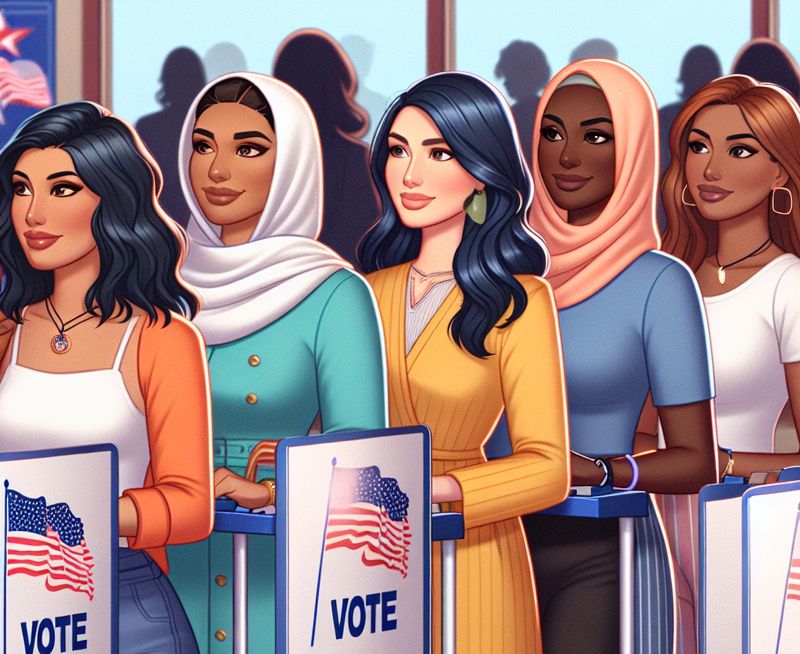Empowered Voices: Women of Color on the Election
The presidential elections are right around the corner and the country is divided more than ever. As women of color—an influential yet often neglected voting bloc—prepare to cast their votes this November, the perception of an unstable economy will be a significant factor.
In a media briefing on May 10, hosted by Ethnic Media Services, a panel of experts go over the numbers based on polls and surveys representing women from the Black, Latina, and AAPI communities.
Speakers
![]()
- Sung Yeon Choimorrow, Executive Director, National Asian Pacific American Women’s Forum
- Regina Davis Moss, President and CEO, In Our Own Voice: National Black Women’s Reproductive Justice Agenda
- Lupe M. Rodriguez, Executive Director, National Latina Institute for Reproductive Justice
- Celinda Lake, President, Lake Research Partners
- Roshni Nedungadi, Chief Research Officer & Founding Partner, HIT Strategies
A recent poll reveals that approximately 57% of Latinx women, 55% of AAPI women, and 49% of Black women believe the country’s situation has deteriorated over the past year. These women feel that their concerns are largely ignored by politicians and candidates.
The survey was conducted by Intersections Of Our Lives, a coalition that includes NAPAWF, In Our Own Voice: National Black Women’s Reproductive Justice Agenda, and the National Latina Institute for Reproductive Justice. Celinda Lake and Roshni Nedungadi polled 850 registered voters each from Black, Latina, and Asian American Pacific Islander communities between March 14 and April 2. A detailed view of the poll results is available on the Intersections of Our Lives website.
Economic concerns, particularly rising costs, are paramount for women of color. According to the poll, 35% of Latina women, a third of AAPI women, and 29% of Black women identified the high cost of goods and services as a key issue. This category encompasses sub-issues such as affordable health care, fair housing, closing the pay gap, and job creation. Notably, 92% of Black women, 89% of AAPI women, and 88% of Latina women prioritize the creation of well-paying jobs.
Access to abortion and care is a priority for over 75% of women of color. Additionally, 93% of Black women, 84% of AAPI women, and 79% of Latina women believe that racism has persisted for too long and that political leaders must implement overdue racial equity policies.
“Women of color represent an enormous potential vote. But we are at a crossroads. They are not going to vote for people unless they see change, see their values represented, and they see people talking about policies that affect their daily lives,” stated Lake.
Candidates need to actively engage with this crucial voting bloc and should not take them for granted, emphasized Nedungadi. She added that women of color are frustrated by being overlooked and are seeking communication and assurance that elected officials are considering and advocating for their agendas.
Dr. Regina Davis Moss highlighted that 79% of Black women voters believe systemic racism has persisted for far too long. She emphasized that Black voters are demanding leaders who will create and champion racial justice systems that are long overdue.
Moss also pointed out that Black maternal and reproductive health is a crucial issue for these voters. She noted that 91% of Black women think Congress must address the high rates of maternal mortality among women of color. According to the CDC, the maternal mortality rate for Black women in 2021 was 69.9 deaths per 100,000 live births, which is 2.6 times higher than the rate for White women.
“Black women are some of the most committed voters; 9 out of 10 women of color have said that voting is very important. We know our votes matter, but we also are pushing back and saying, ‘you know, the onus is not on us to just turn out all the time. Don’t take us for granted. The onus is on you to demonstrate that you understand what we need and to speak to our needs,’” Moss stated.
Lupe Rodriguez explained that Latina voters are driven by candidates who address the issues that matter to them, rather than by partisan politics. They are swayed by leaders who tackle the challenges they face daily, such as immigration and family separation.
Healthcare access remains a major concern for Latino voters, Rodriguez noted, mentioning that this community continues to have the lowest rates of insurance and regular healthcare coverage in the U.S. In 2022, 18% of Hispanics were uninsured, according to the Kaiser Family Foundation.
For AAPI women, key priorities include criminal justice system reform, the enactment of gun violence prevention laws, and paid family medical leave, said Sung Yeon Choimorrow. Although AAPI women are generally motivated to vote, they often feel disillusioned about the impact of their vote.
Choimorrow also addressed the misconception that AAPI women are anti-abortion. She clarified that abortion rights are a significant priority for Indian American women, with more than 75% of Chinese American women supporting abortion access. Furthermore, seven in ten Vietnamese and Korean women and six out of ten Filipina women are pro-choice. As a Korean American, Choimorrow expressed surprise at the conservative stance traditionally attributed to her community regarding this issue.
“I am telling every Korean I know. The more of us that are out there talking about it and changing the narrative, the more our community feels like they can participate and really change the trajectory of this country and how we think,” she said.The perception of a floundering economy will loom large as women of color — a large and reliable, but often overlooked, voting bloc — head to the polls this November.


